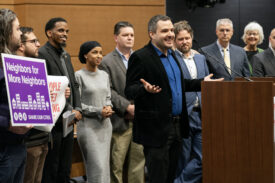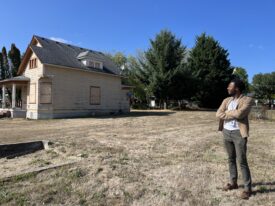This week, Seattle’s City Council voted to revive a pre-1950s fashion—they eased the restrictions on property zoning in southeast Seattle, allowing residents to rent out backyard and garage apartments, often known as “granny flats.” Before urban families began to migrate to the suburbs, urban dwellings commonly featured an accessory apartment which was often occupied by an elderly relative, hence the name.
As we’ve mentionedbefore, there are considerable benefits to granting property owners more choice on how they use their lots. The creation of more residential space in dense areas enriches our communities and reduces strains on the environment. Complete, compact neighborhoods can bring economic stability to local merchants, and reduce the amount of driving needed—lowering traffic-related deaths, commute headaches, and toxic emissions into the air.
While some residents fear that the new zoning definitions will lead to too many cars and people, granny flats can have healthy advantages for communities. They give low-income renters like students and the elderly a more affordable living option, allowing them to remain in their neighborhoods. This is especially helpful to aging residents in staying active and maintaining social connections. And with housing costscontinuing to climb, the extra income from renting out these spaces can be a big help for homeowners with mortgage payments. Plus, who wouldn’t love some more time with Grandma?







Patrick B. McGrath
The Council has said they will not extend this zoning reform to the rest of the city unless neighborhoods ask for it. Time to organize!
tradinlady
Glad to see Seattle’s City Council has some vision and common sense to alleviate a housing shortage and offer some affordability for relative and workforce housing by easing zoning restrictions for “granny flats”. Only wish San Diego’s City Council would get past the NIMBY protests and revise the second unit rules they passed to prevent “granny flats” being built. In a city with lot sizes averaging 5000-7500 sq. ft., San Diego requires twice the lot size to build a unit. Now, how reasonable is that?The benefits far outweigh the perceived problems, so congratulations to you for the courage to make necessary changes and offer one solution for housing.A Disappointed San DieganCatherine Darragh
Anonymous
I think granny flats are a fantastic idea and a terrific way to achieve greater density as well as provide affordable housing options to keep our neighborhoods multi-generational. I hope to see a day when this policy is extended to more neighborhoods. But I do think there is a very real risk that is inadequately addressed by zoning and development codes, and that is the impact of granny flats on aesthetics, and the subsequent impact on community, sustainability and livability. If a “granny flat” is just a second story slapped on top of a big square garage, we will continue to see our Seattle neighborhoods turn into rows of big boxes that “maximize” square footage in an effort (ill-concieved or not) to “maximize” value. I’m of the opinion that this type of building and remuddling destroys the character of our older neighborhoods. Don’t get me wrong, I’m not against modern architecture; I think a lot of contemporary residential design is beautiful and can be integrated in older neighborhoods just fine. But what I’m saying is that a lack of design may cost our communities as much or more than is gained by a pro-granny flat policy itself. People want to live in places they find beautiful, in neighborhoods they find attractive, and they care for those places they value.Is it plausible that as neighborhoods adopt a pro-granny flat policy, they could be required to also develop some type of design review standards for their neighborhood? Standards that might guide things like scale, proportion, perhaps even architectural detail or materials? I’m not looking to create an onerous bureaucratic process, but for a real-world way to make sure that the actual implementation of an urban planning policy would really be an investment in our neighborhoods, creating spaces that people want to stay.